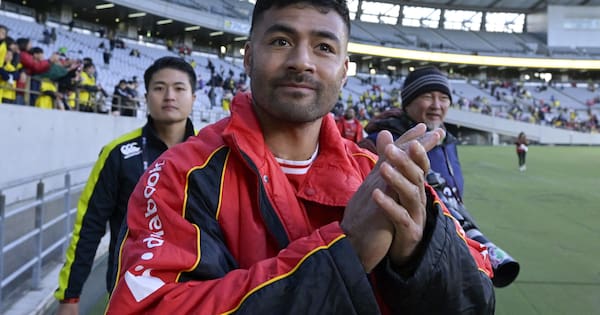Analysis: Attempts by the All Blacks head coach to persuade Richie Mo’unga and Shannon Frizell to break Japan contracts could backfire, writes Patrick McKendry.
The sense that rugby in New Zealand operates in a bubble of its own unique logic once again became apparent yesterday with All Blacks head coach Scott Robertson confirming he had been in talks with Richie Mo’unga and Shannon Frizell about coming home from Japan early to wear the black jersey again.
“My job is to get the best players for the All Blacks,” Robertson said yesterday. “I’m not going to talk on individual players but I need the best available players for our country. What goes on behind the scenes – we have to be professional around the employment stuff.”
All of which is sensible so far. The first bit goes without saying and the employment stuff does, too – it’s certainly important for Mo’unga and Frizell and in particular their employer Toshiba.
Playmaker Mo’unga still has two years remaining on his contract, with loose forward Frizell signed up for another year after this one. They are not contracted to New Zealand Rugby.
The pair, standouts at the last World Cup, are important players for their club – given their quality and recent form, they would be for any team – and are focusing on Toshiba’s playoff match against Suntory on Sunday. Toshiba have lost only one match all season.
It’s here that things start to unravel a little.
Both Robertson and New Zealand Rugby’s manager of professional rugby Chris Lendrum have stated recently that they have been in talks with Mo’unga and Frizell about returning home as soon as possible.
Being so open about the potential for breaking contracts is an interesting approach not least because it has the potential to be unsettling for Mo’unga and Frizell, not to mention those at home who have committed to the New Zealand game – such as Mo’unga’s potential replacement Damian McKenzie.
It will likely be seen by all those connected with Toshiba as highly disrespectful too, particularly when it is not Toshiba’s contract preventing Mo’unga and Frizell from representing the All Blacks this year or any other, but New Zealand Rugby’s own eligibility rules.
Again: Toshiba is not stopping Mo’unga and Frizell from playing for the All Blacks. New Zealand Rugby is.
What is the end game for Robertson and Lendrum and company? It’s presumably a change in those eligibility rules which can only come via a vote by the New Zealand Rugby board, a board, by the way, currently in a state of governance flux and unlikely to be thinking about much else at the moment.

The game’s worsening financial situation in the wake of the controversial Silverlake deal (which was supposed to solve it), may also be taking up the board’s attention, and presumably the breaking of Mo’unga’s and Frizell’s contracts would come with a compensation bill costing several millions of dollars.
Robertson and Lendrum may deserve credit for being honest in front of the media but their determination to sway the opinions of the board in the public arena may end up being detrimental to their cause.
Meanwhile, and importantly, the current eligibility rules may dictate who the next All Blacks captain is, too, after Sam Cane (an unlikely candidate for Robertson’s new regime), confirmed this week he has signed a new three-year deal with Suntory and that this year will be his last as an All Black (if he is selected).
Scott Barrett, a man who formed a formidable partnership with Robertson at the Crusaders, appears increasingly likely to be the man to replace Cane because the rumours in Japan are that Ardie Savea may spend another sabbatical season at Kobe next year.
Savea has made his thoughts on New Zealand’s eligibility laws well known.
“Times are changing,” Savea told reporters in March. “Things are moving fast. What worked five, 10, 15 years ago maybe can’t work now. We’ve just got to be innovative and smart around what we’re doing.
“The country that’s proven that it works, that it helps, is South Africa. The majority of their team’s playing [offshore] and they come together and win the World Cup.
“I don’t think it’s going to change drastically, but I just think that something needs to evolve and grow.”
He’s right, and as it stands it’s difficult to see an All Blacks captain spending back-to-back seasons in Japan.
Source link: Analysis: Razor should tread carefully through eligibility minefield
